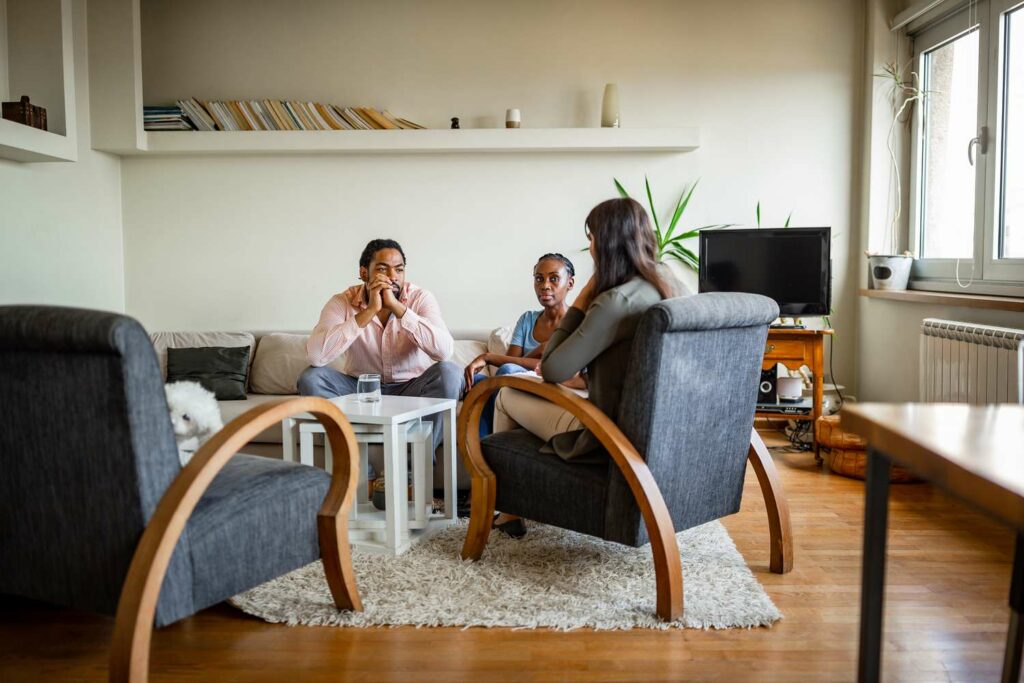Trust is the foundation of any healthy relationship, but sometimes couples may face trust issues that can strain their bond and create significant challenges. Trust issues can stem from various factors, including past relationship experiences, infidelity, lack of communication, and insecurities. When trust issues arise, couples therapy can provide a safe and supportive environment to address these concerns and rebuild trust. In this article, we will explore the causes of trust issues, signs and symptoms to watch for, the role of couples therapy in addressing trust issues, techniques and approaches used in therapy, the benefits of couples therapy, finding the right therapist, what to expect during therapy, self-help strategies, and more.
Contents
- 1 Causes of Trust Issues in Couples
- 2 Signs and Symptoms of Trust Issues
- 3 The Role of Couples Therapy in Addressing Trust Issues
- 4 Techniques and Approaches Used in Couples Therapy
- 5 Benefits of Couples Therapy for Trust Issues
- 6 Finding the Right Couples Therapist
- 7 Finding the Right Couples Therapist
- 8 What to Expect in Couples Therapy
- 9 Self-Help Strategies for Couples with Trust Issues
- 10 Conclusion
Causes of Trust Issues in Couples

Trust issues can have deep-rooted causes that often stem from past experiences. Individuals who have been hurt or betrayed in previous relationships may carry emotional baggage into new partnerships. Infidelity or betrayal within the current relationship can also lead to trust issues.
Furthermore, a lack of communication and transparency between partners can create doubts and suspicions. Insecurities and low self-esteem can exacerbate these issues, causing individuals to question their partner’s intentions and faithfulness.
Signs and Symptoms of Trust Issues
Trust issues can manifest in various ways and can affect individuals differently. However, there are some common signs and symptoms that may indicate someone is struggling with trust issues. These include:
- Suspicion: People with trust issues often have a heightened sense of suspicion. They may be excessively wary of others’ motives, assuming that people have hidden agendas or are out to deceive them.
- Difficulty in forming close relationships: Trust issues can make it challenging to establish and maintain intimate relationships. Individuals may find it hard to open up, be vulnerable, or share personal information with others.
- Fear of betrayal: There is a deep fear of being betrayed or hurt by others, even when there is no evidence to support it. This fear can be pervasive and can make it difficult to trust others, even those who have proven themselves trustworthy in the past.
- Avoidance of emotional intimacy: People with trust issues may struggle with emotional intimacy and may avoid getting too close to others. They may keep their emotions guarded and have difficulty expressing their true feelings.
- Hypervigilance: Trust issues can lead to hypervigilance, where individuals are constantly on high alert for signs of deception or betrayal. They may scrutinize others’ words and actions, looking for any potential signs of dishonesty.
The Role of Couples Therapy in Addressing Trust Issues

Couples therapy can play a vital role in addressing trust issues within a relationship. Trust is a fundamental component of healthy and fulfilling partnerships, and when trust is damaged or compromised, it can significantly impact the relationship’s well-being. Here’s how couples therapy can help:
- Creating a safe space: Couples therapy provides a safe and neutral environment where both partners can express their feelings, concerns, and perspectives without judgment. The therapist helps establish open communication, ensuring that both partners feel heard and validated.
- Identifying the root causes: Trust issues often stem from past experiences, such as betrayal or trauma. A skilled couples therapist can help uncover the underlying reasons for the trust issues, exploring individual histories, relationship dynamics, and any unresolved conflicts.
- Rebuilding trust: Rebuilding trust is a gradual process, and couples therapy provides a structured framework to facilitate this process. The therapist can guide the couple in developing strategies and techniques to rebuild trust, emphasizing open communication, transparency, and consistent follow-through on commitments.
- Improving communication: Trust issues often lead to communication breakdowns and misunderstandings. Couples therapy helps improve communication skills, teaching active listening, empathy, and effective expression of needs and concerns. Learning healthy communication patterns enhances trust and reduces misunderstandings.
Techniques and Approaches Used in Couples Therapy
Couples therapy incorporates various techniques and approaches to address relationship issues and promote healthier dynamics. The specific techniques used may vary depending on the therapist’s training, theoretical orientation, and the unique needs of the couple. Here are some commonly used techniques and approaches in couples therapy:
- Emotionally Focused Therapy (EFT): EFT focuses on identifying and transforming negative emotional patterns within the relationship. It helps couples develop a secure emotional bond by fostering emotional responsiveness and accessibility. EFT emphasizes creating a safe and supportive environment where partners can express their emotions and needs.
- Cognitive-Behavioral Therapy (CBT): CBT focuses on identifying and changing negative patterns of thinking and behavior. In couples therapy, CBT techniques may be used to challenge distorted beliefs, improve communication skills, and develop problem-solving strategies. CBT aims to enhance couples’ understanding of the connection between thoughts, emotions, and behaviors.
- Imago Relationship Therapy: Imago therapy focuses on healing unresolved childhood wounds that impact adult relationships. It helps partners understand and empathize with each other’s early experiences and works to create a more conscious and compassionate connection. Imago therapy often uses structured dialogue techniques to facilitate communication and increase understanding.
Benefits of Couples Therapy for Trust Issues
Couples therapy can provide several benefits for addressing trust issues within a relationship. Here are some of the key benefits:
- Safe and supportive environment: Couples therapy offers a safe and neutral space where both partners can openly express their feelings, concerns, and vulnerabilities. The therapist ensures that both individuals feel heard, validated, and understood, creating an environment that fosters trust and openness.
- Improved communication: T
Finding the Right Couples Therapist
rust issues often stem from communication breakdowns and misunderstandings. Couples therapy helps partners develop healthier and more effective communication skills. They learn active listening, assertiveness, and empathetic responding, which can facilitate understanding, empathy, and conflict resolution.
- Rebuilding trust: Rebuilding trust is a complex process, and couples therapy provides guidance and structure for this journey. The therapist helps partners identify the specific trust issues, understand their underlying causes, and work together to develop strategies to rebuild trust gradually. This may involve setting clear expectations, establishing boundaries, and promoting transparency and accountability.
- Emotional healing and individual growth: Trust issues are often linked to past experiences and individual insecurities. Couples therapy allows each partner to explore their emotional wounds and work on their personal growth. The therapist can help individuals address unresolved traumas or issues that contribute to their trust issues, leading to personal healing and growth.
Finding the Right Couples Therapist

Finding the right couples therapist is essential to ensure that you receive the support and guidance that best fits your needs and goals. Here are some steps to help you find a suitable couples therapist:
- Determine your goals: Clarify your goals for couples therapy. What specific issues or challenges do you want to address? Understanding your objectives will help you find a therapist who specializes in those areas.
- Seek recommendations: Ask for recommendations from trusted friends, family members, or healthcare professionals. Personal referrals can provide valuable insights and firsthand experiences with therapists they have worked with.
- Research therapists online: Look for therapists specializing in couples therapy in your area. Read their profiles, biographies, and areas of expertise to see if they align with your needs. Websites like Psychology Today and TherapyDen can be useful resources for finding therapists.
- Consider their qualifications and experience: Review the therapists’ qualifications, certifications, and experience. Look for therapists who have specific training or specialization in couples therapy. Additionally, consider their years of experience and their approach to therapy.
- Check therapist reviews and testimonials: Read online reviews or testimonials from previous clients to get an idea of their experiences with the therapist. While individual experiences can vary, reviews can provide helpful insights into the therapist’s approach, effectiveness, and rapport with clients.
What to Expect in Couples Therapy
Couples therapy typically involves an initial assessment to identify specific concerns and establish therapeutic goals.
- Regular therapy sessions provide a platform for couples to discuss their trust issues openly.
- Therapists often assign homework exercises and activities to reinforce therapeutic progress between sessions.
- Active participation and commitment from both partners are vital for the success of therapy.
It is important to remember that progress may be gradual, and setbacks can occur along the way.
Self-Help Strategies for Couples with Trust Issues
While couples therapy is often recommended for addressing trust issues, there are also self-help strategies that couples can practice together to foster trust and improve their relationship. Here are some self-help strategies for couples with trust issues:
- Open and Honest Communication: Establish open and honest communication as a foundation for rebuilding trust. Encourage each other to express feelings, concerns, and needs openly and without judgment. Practice active listening and empathy to create a safe space for effective communication.
- Transparency and Consistency: Foster trust by being transparent and consistent in your words and actions. Follow through on commitments and promises, and be reliable in your behaviors. Consistency helps establish a sense of reliability and predictability, which is crucial for rebuilding trust.
- Rebuilding Trust in Small Steps: Rebuilding trust takes time and patience. Start by setting small, achievable goals and milestones to rebuild trust gradually. Celebrate the progress made along the way and acknowledge the efforts each partner is putting into rebuilding trust.
- Accountability and Responsibility: Take accountability for your actions and their impact on the relationship. Acknowledge any mistakes or betrayals, and take responsibility for repairing the trust. Be willing to make amends and work on personal growth to prevent similar issues in the future.
Conclusion
Trust issues can significantly impact the dynamics of a relationship, but with the right support and guidance, couples can overcome these challenges. Couples therapy provides a nurturing space to explore the underlying causes of trust issues and develop effective strategies for rebuilding trust. By enhancing communication, strengthening emotional bonds, and fostering a sense of security, couples can create a healthier and more fulfilling partnership. Remember, trust takes time and effort to rebuild, but the rewards are well worth it.
Addressing and resolving a couple of issues is essential for a strong and lasting partnership. If you have any queries regarding Online Couple Counseling experienced therapists at CoupleMantra can help. Book a trial couple therapy session.


